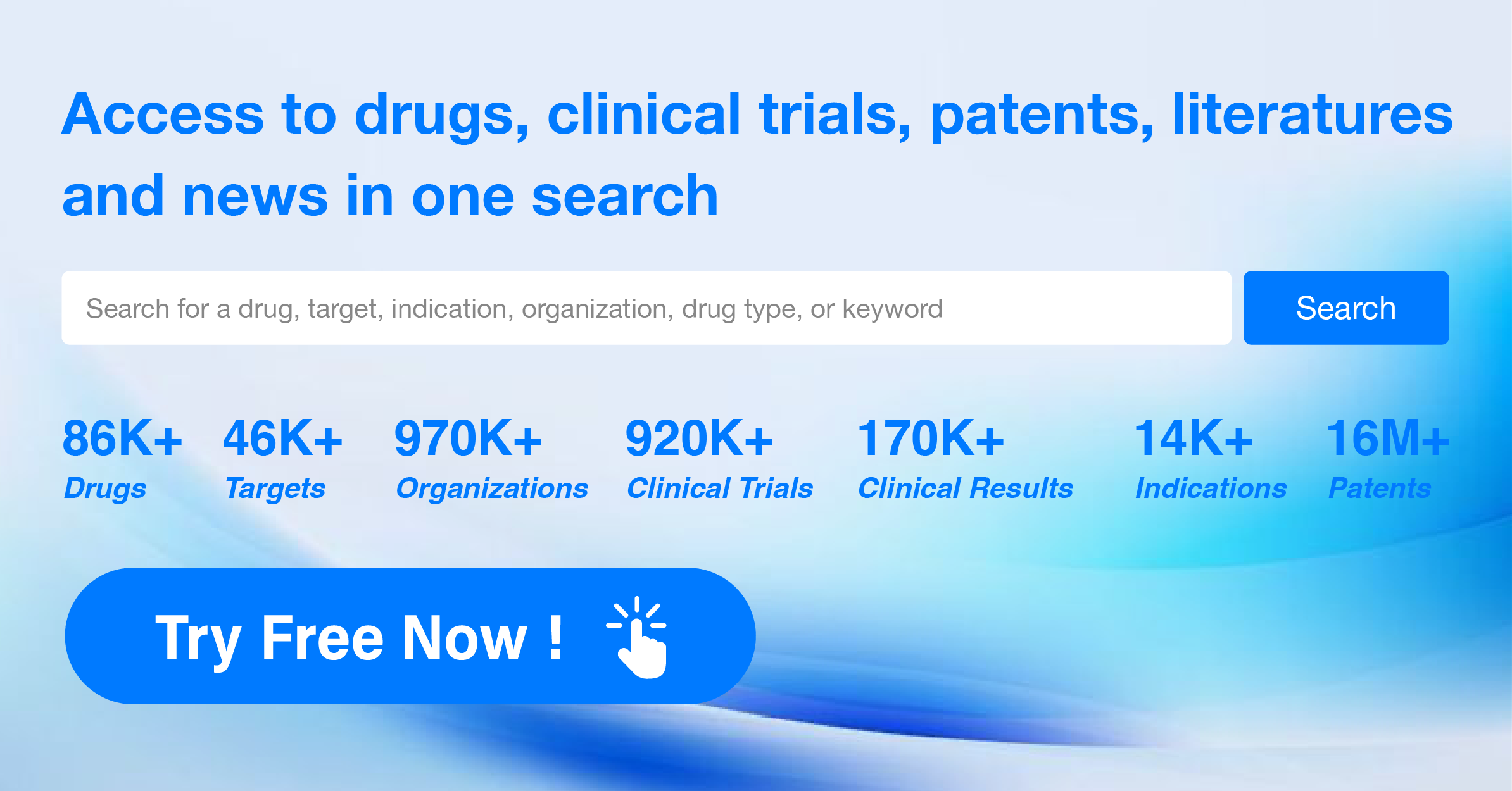Pharma Frontiers: Daily Digest of Global Pharmaceutical News - May 15
1.FDA Grants Priority Review to Leading Anti-inflammatory Drug for the Treatment of Chronic Sinusitis with Nasal Polyps
On May 14th, Regeneron Pharmaceuticals and Sanofi announced that the U.S. Food and Drug Administration (FDA) has accepted their Supplemental Biologics License Application (sBLA) for Dupixent (dupilumab) as an adjunct maintenance treatment for adolescents aged 12 to 17 with inadequately controlled chronic rhinosinusitis with nasal polyps (CRSwNP). The application has been granted priority review status. If approved, Dupixent would be the first treatment authorized by the FDA for inadequately controlled CRSwNP in adolescents aged 12 to 17.
The submission of this sBLA was primarily based on the extrapolation of efficacy data from two pivotal adult CRSwNP trials, SINUS-24 and SINUS-52. Results from these trials demonstrated that, compared to placebo, Dupixent significantly improved the severity of nasal congestion/blockage, size of nasal polyps, and sense of smell within 24 weeks, while also reducing the need for systemic corticosteroids or surgery. Additionally, the sBLA is supported by safety data from Dupixent’s currently approved indications in adolescents. The overall safety profile observed in SINUS-24 and SINUS-52 was consistent with the known safety profile of Dupixent in its approved indications. In the 24-week safety data from SINUS-24 and SINUS-52, the more common adverse events (≥3%) associated with Dupixent compared to placebo were injection site reactions and arthralgia.
CRSwNP is driven by underlying type 2 inflammation, which can block the sinuses and nasal passages, potentially leading to a loss of smell. Dupixent is a fully human monoclonal antibody that inhibits signaling of the IL-4 and IL-13 pathways, thus suppressing type 2 inflammatory responses.
2.The bispecific antibody petosemtamab has been granted Breakthrough Therapy designation by the FDA
On May 14th, Merus announced that the U.S. FDA had granted Breakthrough Therapy Designation (BTD) to its investigational bispecific antibody, petosemtamab, for the treatment of patients with recurrent or metastatic head and neck squamous cell carcinoma (HNSCC), who have progressed following platinum-based chemotherapy and PD-1 or PD-L1 targeted antibody therapies. Merus plans to initiate a Phase 3 trial of petosemtamab by mid-2024, to evaluate its efficacy and safety as a monotherapy second-line treatment for patients with HNSCC. This breakthrough therapy designation is supported by data from ongoing open-label, multi-center Phase 1/2 clinical trials, which assess petosemtamab as a monotherapy for patients with advanced solid tumors, including pretreated (recurrent or metastatic) HNSCC. According to previously released preliminary Phase 1/2 clinical study data by Merus, the overall response rate (ORR) among 43 evaluated patients receiving this treatment was 37.2% (n=16/43, 95% CI: 23.0-53.3), with a disease control rate (DCR) of 72.1% (n=31/43, 95% CI: 56.3-84.7). The median overall survival (OS) for patients was 11.5 months (n=29/49, 95% CI: 7.2-20.6). Previous data indicated that HNSCC patients resistant to platinum drugs and PD-1 or PD-L1 therapies had an ORR of 5-13% and a median survival of about six months with existing second-line treatments. Merus plans to provide updated data on the efficacy, durability, and safety of this cohort in the second half of 2024. Petosemtamab (MCLA-158) is an investigational EGFR and LGR5 targeting antibody-dependent cell cytotoxicity (ADCC) enhanced IgG1 bispecific antibody developed through Merus's Biclonics platform.
3.AstraZeneca Files for New Indication of Anti-IL-5Rα Monoclonal Antibody Benralizumab in China
On May 14, the website of CDE (China's Center for Drug Evaluation) indicated that a new indication application for the injection solution of AstraZeneca’s benralizumab (Fasenra) has been accepted. It is speculated that the new indication is for add-on maintenance treatment in patients aged 6-11 with eosinophilic asthma. Benralizumab was first filed for marketing in China in June 2023, is currently under review, and is expected to be approved within this year.
Originally developed by Kyowa Kirin, benralizumab’s rights were acquired by MedImmune in December 2006 for commercialization in the USA, Europe, and other countries. In April 2007, AstraZeneca acquired MedImmune for $15.6 billion, incorporating 45 pipeline products, including benralizumab. In October 2016, AstraZeneca expanded its commercialization rights for benralizumab to Japan. In March 2019, a new licensing agreement was reached with Kyowa Kirin granting AstraZeneca development and commercialization rights in Asia and global commercial rights.
Benralizumab directly binds to the IL-5 receptor alpha on eosinophils and attracts natural killer cells to induce rapid and near-total depletion of eosinophils through apoptosis (programmed cell death). Benralizumab was first approved in the United States in November 2017 under the brand name Fasenra, for add-on maintenance treatment in patients 12 years and older with severe eosinophilic asthma. In October 2019, the FDA approved Fasenra in a pre-filled, single-use autoinjector (FASENRA Pen™) for patient self-administration. In April of this year, the FDA approved the expansion of Fasenra’s indication to include children aged 6 to 11 with severe eosinophilic asthma phenotype for add-on maintenance treatment.
4.Cytokinetics Announces Phase 3 Clinical Results for Potential Breakthrough Therapy in Cardiomyopathy
On May 14, Cytokinetics announced that its investigational therapy, aficamten, achieved the primary endpoint and all secondary endpoints in the pivotal Phase 3 clinical trial SEQUOIA-HCM for patients with symptomatic obstructive hypertrophic cardiomyopathy (HCM). The therapy has shown rapid and sustained improvement in patient symptoms and functionality. Detailed data were published in The New England Journal of Medicine (NEJM) and reported at the Heart Failure 2024 international conference hosted by the European Society of Cardiology. This innovative therapy has been listed by the industry media outlet Evaluate as one of the top ten potential breakthrough therapies to watch. The results from SEQUOIA-HCM demonstrated that treatment with aficamten for 24 weeks significantly enhanced patients’ exercise capacity, as measured by the peak oxygen uptake (pVO2) in cardiopulmonary exercise testing (CPET), with an increase of 1.74 mL/kg/min (95% CI: 1.04-2.44, p=0.000002) compared to placebo. Notably, aficamten's positive effects were consistently observed across different patient subgroups. Aficamten is a selective small molecule inhibitor of cardiac myosin, which functions by reducing the number of active myosin power bridges during each cardiac cycle, thus inhibiting the excessive myocardial contraction associated with hypertrophic cardiomyopathy. Cytokinetics plans to submit regulatory applications to authorities in the United States and European Union later this year.
5.GSK's long-acting HIV treatment obtains another indication approval in China, reducing the risk of HIV infection by 91%!
On May 13, GlaxoSmithKline (GSK) announced that its joint venture specialized in HIV medications, ViiV Healthcare, has recently received approval from China's NMPA for Cabotegravir sodium tablets and Cabotegravir injections. These are approved for pre-exposure prophylaxis (PrEP) of HIV-1 in adults and adolescents at risk of infection who weigh at least 35 kg, to reduce the risk of sexually transmitted HIV-1 infection, in combination with safe sexual practices for enhanced PrEP effectiveness. This regimen allows for HIV prevention without the need for daily medication. In a phase 2b/3 clinical study, compared to the control group, the group receiving Cabotegravir long-acting injections showed a 91% decrease in the risk of HIV infection. Pre-exposure prophylaxis (PrEP) is an effective biological prevention method that uses antiviral drugs to prevent HIV infection. Cabotegravir long-acting injection acts as an integrase strand transfer inhibitor (INSTI), which inhibits HIV replication by preventing the integration of viral DNA into the genetic material of human immune cells (T cells). This step is crucial in the HIV replication cycle and is the reason why it becomes a chronic condition.
In July 2023, both Cabotegravir injections and Cabotegravir sodium tablets were officially approved by China’s NMPA in combination with Rilpivirine Hydrochloride injections and Rilpivirine tablets for the treatment of HIV-1 infected patients who have achieved virological suppression. According to a GSK press release, the Cabotegravir long-acting regimen requires at least six injections per year for HIV pre-exposure prevention. Recipients will receive an initial injection of 600mg (3ml) each month for the first two months, followed by a 600mg (3ml) injection every two months thereafter. Before the first injection, users can choose to take Cabotegravir sodium tablet orally for about a month (at least 28 days) to assess drug tolerance.
6.Merck Announces Termination of Phase III Melanoma Study of PD-1+TIGIT Dual Therapy for Failure to Meet Primary Endpoint
On May 13th, Merck announced the termination of its ongoing Phase III KeyVibe-010 study, which compared MK-7684A (a combination of Pembrolizumab and Vibostolimab) against solo Pembrolizumab as adjuvant therapy in patients with high-risk melanoma stages IIB-IV following surgical resection. The termination was based on the study reaching the futility boundary in a planned interim analysis, indicating that the relapse-free survival (RFS) for patients in the MK-7684A group did not significantly extend compared to those receiving only Pembrolizumab. The proportion of patients discontinuing all treatments in the MK-7684A group was higher, primarily due to immune-mediated adverse reactions, making it highly unlikely for MK-7684A to outperform Pembrolizumab alone in terms of RFS. Following recommendations from the Independent Data Monitoring Committee (DMC), Merck is currently unblinding the study and suggesting that patients treated with MK-7684A may switch to Pembrolizumab monotherapy. Data analysis of this study is ongoing, and Merck plans to release comprehensive results in the near future.
Vibostolimab, developed by Merck, is an anti-TIGIT monoclonal antibody that functions by obstructing the interaction of the TIGIT receptor with its ligands (CD112 and CD155), thereby restoring anti-tumor activity and activating T lymphocytes that help destroy cancer cells. Although results from the KeyVibe-010 study were disappointing, Merck has stated that this does not impact other ongoing studies, which will continue as planned.
Melanoma is the deadliest form of skin cancer, characterized by the uncontrolled growth of pigment-producing cells. The incidence of melanoma has been increasing over the past decades, with over 330,000 new cases diagnosed globally in 2022. It is estimated that in 2024, over 100,000 new cases of melanoma will be diagnosed in the United States.
7.Novo Nordisk Announces Latest Results from Phase III FRONTIER 2 Study on Extended-Duration Therapy for Hemophilia A
On May 13th, Novo Nordisk announced the primary outcomes of the phase II clinical trial, FRONTIER 2, for the extended-duration hemophilia A treatment, Mim8. This trial assessed the efficacy and safety of Mim8 with dosing once a week or once a month via subcutaneous injection, compared to patients who received either no prophylactic treatment or were previously on prophylactic coagulation factor treatment. The study involved hemophilia A patients aged 12 and older, both with and without coagulation factor inhibitors. Hemophilia A is an X-linked recessive hereditary bleeding disorder clinically characterized by abnormal quality or quantity of coagulation factor VIII (FVIII).
The data revealed that both weekly and monthly administrations of Mim8 significantly reduced the number of bleeding events requiring treatment compared to no prophylactic treatment and previous coagulation factor prophylactic treatment, thus meeting the trial's co-primary endpoints. In the untreated population, weekly and monthly Mim8 administration reduced the bleeding events requiring treatment by 97% and 99% respectively. Among patients previously on coagulation factor prophylaxis, weekly and monthly Mim8 treatments reduced the bleeding events requiring treatment by 48% and 43% respectively, compared to previous coagulation factor prophylactic treatments.
Mim8 is a bispecific antibody that mimics the function of coagulation factor VIIIa. Administered via subcutaneous injection, it facilitates the interaction between coagulation factors IXa and X, substituting the missing factor VIII and thereby effectively restoring the body's capacity to generate thrombin and ensure blood coagulation.
Following discussions with regulatory authorities, Novo Nordisk plans to submit the first regulatory application for Mim8 by the end of 2024.
8.HUTCHMED and Hengrui Pharmaceuticals Reach Collaboration to Develop Pancreatic Cancer Combination Therapy
On May 14, HUTCHMED announced the initiation of a Phase 2/3 clinical trial in China to assess the combination therapy comprised of HUTCHMED’s candidate drug Surufatinib, Hengrui Pharmaceuticals’ PD-1 antibody Camrelizumab, albumin-bound paclitaxel, and Gemcitabine for the first-line treatment of patients with metastatic pancreatic ductal adenocarcinoma (PDAC). The first participant received their initial dose on May 8, 2024. Pancreatic ductal adenocarcinoma is a highly aggressive cancer, accounting for over 90% of pancreatic cancers. Common treatments include chemotherapy, surgery, and radiation therapy; however, treatment outcomes have not shown significant improvements, with less than 20% of patients with metastatic pancreatic cancer surviving more than one year.
Surufatinib is a novel oral small molecule kinase inhibitor with dual anti-angiogenic and immune-modulatory activities. It inhibits vascular endothelial growth factor receptors (VEGFR) and fibroblast growth factor receptors (FGFR) to block tumor angiogenesis and suppresses colony-stimulating factor-1 receptor (CSF-1R) to modulate tumor-associated macrophages, enhancing the body's immune response against tumor cells. Camrelizumab (SHR-1210) is a humanized monoclonal antibody targeting the programmed death-1 (PD-1) receptor and is currently being tested in over ten clinical trials worldwide across a variety of tumors and treatment settings. In China, Camrelizumab has been approved for nine indications including hepatocellular carcinoma (second-line and first-line), relapsed/refractory classical Hodgkin lymphoma (third-line), esophageal squamous cell carcinoma (second-line), and nasopharyngeal carcinoma (third-line or above), as well as in combination with chemotherapy for first-line treatment of non-small cell lung cancer (non-squamous and squamous), esophageal squamous cell carcinoma, and nasopharyngeal carcinoma.
9.Over $2.1 Billion! Takeda Secures Next-Generation Alzheimer’s Therapy
On May 14th, Takeda and AC Immune announced the signing of a global exclusive option and license agreement valued at over $2.1 billion for the latter’s immunotherapy targeting toxic amyloid-beta (Aβ) forms, including ACI-24.060 for the treatment of Alzheimer's Disease (AD). Alzheimer’s is the most common neurodegenerative disease in the elderly, significantly and profoundly impacting not only the patients but also their families, communities, and society at large. Amyloid plaques in the brain are a hallmark of AD, making Aβ a crucial target for new drug development. An example is Leqembi (lecanemab), which targets Aβ and received full approval from the U.S. FDA in July last year for treating AD patients.
ACI-24.060 is an anti-Aβ vaccine developed based on AC Immune’s SupraAntigen platform, designed to elicit a polyclonal antibody response against Aβ oligomers and pyroglutamate Aβ. These Aβ species are considered key drivers of amyloid deposition and disease progression. This investigational vaccine candidate has potential to inhibit amyloid plaque formation and enhance plaque clearance, potentially delaying or preventing disease progression. ACI-24.060 is currently under investigation in the Phase 1b/2 trial named ABATE.
This randomized, double-blind, placebo-controlled trial aims to evaluate the safety, tolerability, immunogenicity, and efficacy of this immunotherapy in early-stage AD patients and adults with Down syndrome, who are at increased risk of developing AD. So far, no safety concerns have been found in the ABATE trial following several evaluations by the Data Safety Monitoring Board (DSMB), maintaining consistency with previous results. ACI-24.060 has also shown positive immunogenicity data, with low-dose ACI-24.060 inducing an anti-Aβ antibody response as early as six weeks after vaccination (two weeks following the second dose) according to data released last year.




